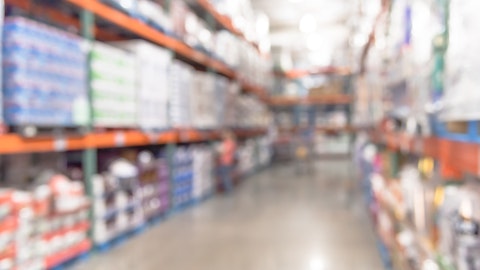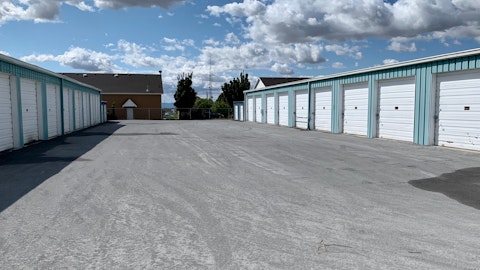Keegan Carl: Got it. That’s it for me. Thanks for the time guys.
Operator: Our next question comes from Jamie Wilen from Wilen Management. Please go ahead, your line is open.
James Wilen: Thanks. Joe, you’ve always mentioned that fleet utilization is one of the keys to profitability for U-Haul. I realize that during the COVID-related spike, we didn’t have enough product there. But given that demand is a little down, shouldn’t we reduce the fleet size a bit right now so we can increase utilization?
Joe Shoen: Absolutely. We have reduced the pickup advanced fleet roughly 4,000 units. And we will trim some out. You reduce the fleet, Jamie, as a tail end. Yes. That’s these trucks that we’ll take them to sale.
James Wilen: Okay. Okay. On the self-storage side, you have a chart in there for the various occupancy rates in metropolitan areas around the country. Does that guide you at all as to where you should put your resources as you grow your self-storage business? In other words, putting more units in the ones where occupancy rates run very high like Georgia and less in areas like Pennsylvania where they’re running lower?
Joe Shoen: Generally speaking, yes, a lot of the decisions get down to a micro market. So let’s say, 3 or 5-mile circle, not a state like Pennsylvania. So there are still opportunities in Pennsylvania. There are more opportunities in Georgia. So we kind of sort through that, it’s a little bit opportunistic because there has to be a site available, so you can find some places where the occupancy and the rate are great, but the sites are just very, very difficult, very, very cost prohibitive. I right now have 3 sites that we committed to and now we’re not going to get land use on, so I’m going to be stuck with 3 sites, but in the competitive real estate market within, we had to go hard before we can be absolutely certain land use that will bite you.
So they’re great areas, but they’re not going to let us build on them, but everything comes out on. So yes, you’re always looking for rate. And every time we do a project, we pro forma a rate, of course. And rates around the country can vary substantially. Certainly $0.40 a square foot per month is very much a — you can find that variance. And it’s not always explained by costs or whatever. So you’re trying to sort for places where you’re going to have a rate that at least is going to allow you to make any profit — forecast a profit and get some of these markets, they’ll kick on L.A. because it’s been a rough one. You can buy something in L.A. at the prices that stuff is selling for, very, very difficult to project the profit. I would say our movement in L.A. over the last 4 years has been largely driven by, we have to do something or we’re going to go out of business, not it’s a huge profit opportunity, okay?
In other words, we need some network here, and we got to get in, but are we going to make a money that’s going to make Jason and his team happy, hard to forecast that. Now with this inflation that’s been running, that may bail us out on some of these things. You don’t know for a fact. But yes, absolutely, we’re trying to go where the occupancy and rate combination would suggest that it’s a good thing to go there. Now of course, so are a lot of other people and over the last 20 years, there’s been a lot more of people accumulating information on these markets. So 1 time, I think we clearly had the best information on that with public storage very close to us. Now there’s third-party sources that have pretty good information on rates and occupancy.
So it’s not a big secret where these pockets are. Does that make sense? So we have to be careful.
James Wilen: Yes. In self-storage now, we’re doing on a run rate probably $900 million to $1 billion of revenues. And again, when you look at the publicly traded peers like CubeSmart and when LSI was public. I mean the market value for $1 billion of self-storage revenue was about $8 billion. How can we remove that value gap or close that value gap for U-Hauls with where the third largest self-storage, we’re a good operator, and we’ve grown at a faster rate of building new units than anybody else that I can see? And any thoughts for how we can close that value gap for shareholders?
Joe Shoen: We did a couple of things trying to make the shares trade a little bit better that we’re working, of course, with analysts, and you heard some of them on the call here today to try to get them on board. And then, of course, we’re stuck with our performance. So of course, at the end of the day, you have to perform. So I think we are building in some increases, but I don’t see us seeing those kinds of evaluations in the next 3 years. No, I just don’t — I don’t see that that’s going to happen. No. Of course, all of my family’s wealth is tied up in this operation, okay, 100% trust me. Yes. Yes, if this stuff trades at that, it’s a good deal for me. No question about it. I can add a subtract I have a cuisine of interest.
I maybe have a little bit different time line, but I got an interest in Europe, a very patient person with us. Much longer than normal time horizon in my experience compared to your peer group or at least what I’ve been exposed to. But it has to happen, and we’re working towards that.
James Wilen: And lastly, when you talk about disposal of vehicles, a lot of the equipment rental companies have gone from putting all their fleet at auctions to doing a bit of it themselves and feeling like they can gather a much higher price per unit if they can do it themselves. Does U-Haul send everything, all the vans to auction? Or do we have a mechanism ourselves where we dispose of them to try and get a higher revenue on disposal?
Joe Shoen: If you’re speaking of a van, they’re also like a Ford Econoline van, that sort of a thing.
James Wilen: Yes, I understood trucks would probably be a bit more difficult, but yes, the vans would probably be easier.
Joe Shoen: Trucks, we sell 90% ourselves. We have a vast sales organization. We sell 90% of our own 6-wheeled trucks. So with the vans, we do what we call, I don’t think the term they use, but I think it’s commercial sales. So we do a fair amount of commercial sales outside of the auctions, but the price is not a lot different here, just basically it’s someone who’s bought your truck for years, and they’re good medium-sized fleets, we have different people that run 200 plumbers and so they come to us, and they want to buy 12 or 15 trucks and they just deal direct with us. We have a central sales operation, Internet presence. And so yes, we do sell them ourselves. We have not been successful with getting that kind of volume, say, 30% or 40% go off of our own lots in those particular vehicles.



